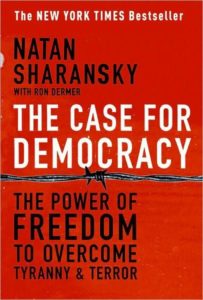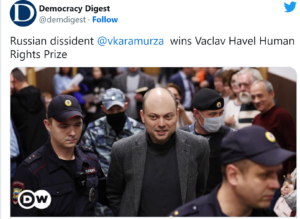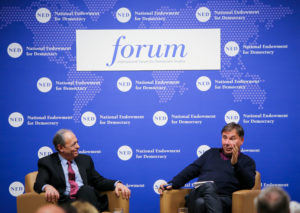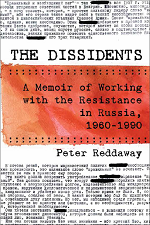 With Moscow’s barbaric aggression against Ukraine, Russia has experienced a quick return to almost Stalinist-era levels of repression, says former Soviet dissident Natan Sharansky. New laws have made it impossible for the free press and human rights organizations to operate. Some outlets have closed voluntarily, while others, including the Helsinki Group and Memorial — which only last year was a co-recipient of the Nobel Peace Prize — have been forcibly shut down. Prison sentences for criticizing the regime are becoming increasingly common and harsh.
With Moscow’s barbaric aggression against Ukraine, Russia has experienced a quick return to almost Stalinist-era levels of repression, says former Soviet dissident Natan Sharansky. New laws have made it impossible for the free press and human rights organizations to operate. Some outlets have closed voluntarily, while others, including the Helsinki Group and Memorial — which only last year was a co-recipient of the Nobel Peace Prize — have been forcibly shut down. Prison sentences for criticizing the regime are becoming increasingly common and harsh.
Consider the cases of Putin’s most prominent domestic critics, Vladimir Kara-Murza and Alexei Navalny, he writes for The Washington Post:
- Kara-Murza’s only transgression was to work tirelessly, including as a Post Opinions contributor, defending Russia’s nascent democratic institutions and speaking out against the war in Ukraine. For this, Kara-Murza was recently sentenced to 25 years in prison, one of the first such lengthy sentence for a political “crime” since the time of Joseph Stalin.
- Navalny, meanwhile, was jailed repeatedly for his work exposing corruption at the highest levels of Russian society. Since his most recent imprisonment a year and a half ago, his sentence has been repeatedly extended on invented charges. He had already spent more than 150 days in the punishment cell.
 Mr. Putin may not have quite the levers his Soviet predecessors had, adds The commercialized and globally connected society that has evolved in Russia over the three decades since the Soviet Union collapsed cannot be put back in the bottle. Nor does Mr. Putin have the Utopian ideology that enabled Soviet leaders to claim they were working for the betterment of humankind, though he has concocted a national narrative of sorts, based on Russian and Soviet history and mythology and his abhorrence of the West.
Mr. Putin may not have quite the levers his Soviet predecessors had, adds The commercialized and globally connected society that has evolved in Russia over the three decades since the Soviet Union collapsed cannot be put back in the bottle. Nor does Mr. Putin have the Utopian ideology that enabled Soviet leaders to claim they were working for the betterment of humankind, though he has concocted a national narrative of sorts, based on Russian and Soviet history and mythology and his abhorrence of the West.
What he has done instead is create a system in which everything — the government, the political police, the legislature, the military — depends personally on him, he writes for The New York Times:
 “We make a distinction between ‘open’ and ‘closed’ societies, but there is also a distinction between ‘openings’ and ‘closings,’” Ivan Krastev* (right), a Bulgarian political scientist and one of the foremost chroniclers of the collapse of the Soviet empire, told me. “The generation of Soviet people in the 1970s and 1980s lived in a closed society that was opening, discovering that things that had been impossible were becoming possible. Putin’s is a period of radical closings. People are losing things they felt had finally been granted them. Openings led to hope; this system leads to hopelessness.”
“We make a distinction between ‘open’ and ‘closed’ societies, but there is also a distinction between ‘openings’ and ‘closings,’” Ivan Krastev* (right), a Bulgarian political scientist and one of the foremost chroniclers of the collapse of the Soviet empire, told me. “The generation of Soviet people in the 1970s and 1980s lived in a closed society that was opening, discovering that things that had been impossible were becoming possible. Putin’s is a period of radical closings. People are losing things they felt had finally been granted them. Openings led to hope; this system leads to hopelessness.”
History shows that there are two necessary conditions for the fall of a tyrannical government such as Putin’s, Sharansky adds:
 The first is the presence of dissidents who are willing to put the struggle for freedom above their own survival. In Russia, there are thousands of people ready to speak out against their government. What is more, thanks to social media, they can broadcast their messages instantaneously to the entire world. Outside powers therefore have an army of allies prepared to mobilize in the fight against the regime.
The first is the presence of dissidents who are willing to put the struggle for freedom above their own survival. In Russia, there are thousands of people ready to speak out against their government. What is more, thanks to social media, they can broadcast their messages instantaneously to the entire world. Outside powers therefore have an army of allies prepared to mobilize in the fight against the regime.- The second condition is leaders and citizens of the free world standing in solidarity with those struggling inside. Today, because of his unforgivable aggression in Ukraine, Putin has earned the opprobrium of the world. Yet much more can be done to stop him: by linking all economic and other contacts with his regime to the fate of these democratic dissidents. RTWT
*A member of the editorial boards of the NED International Forum’s Journal of Democracy.
@vkaramurza’s only transgression was to tirelessly defend Russia’s nascent democratic institutions & oppose the war in Ukraine, @NatanSharansky writes for @washingtonpost. @navalny was jailed repeatedly for exposing corruption at the highest levels. https://t.co/UHHGZ2OERb
— Democracy Digest (@demdigest) May 8, 2023







